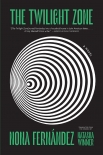The Twilight Zone Nona Fernández (e book reader for pc .TXT) 📖

- Author: Nona Fernández
Book online «The Twilight Zone Nona Fernández (e book reader for pc .TXT) 📖». Author Nona Fernández
A car stops nearby.
In it is a clerk from the Civil Registry office.
The lawyer recognizes his contact. They exchange looks.
The clerk exits the car and climbs surreptitiously into the van. In the back, he gets to work with the man who tortured people. The process is brief, it shouldn’t take them long. Preprepared forms, signatures, fingerprints.
The lawyer keeps a lookout. Everything seems normal out on the street. No one in the neighborhood has any idea what’s happening inside the van. A woman goes by with a child in a stroller. Two grandmothers walk calmly past the church. They smile at him when their gazes meet. If there’s something strange / in your neighborhood / who you gonna call? Ghostbusters!
A police van appears in the area.
It’s moving slowly and it halts to observe the vehicle from Manantial Books.
The lawyer quickly picks up a delivery form and looks away from the national police as they drive past. He hums the song on the radio as he pretends to work, scribbling who knows what with a pencil on an imaginary delivery list.
The cops, he warns under his breath.
In the back, the man who tortured people is sweating in the December heat and from nerves. His fingerprint won’t take. The ink refuses to stick to his damp fingers and when he touches the paper, all he leaves are smears, random blurry lines. They try again. Two, three, four times, but it’s no good. Despair settles over the van. For a brief moment the man who tortured people imagines that his body is dissolving. That his face is no longer his face, that he himself is only a shadow or a reflection of what he was or is. A blot as black as the ones he’s leaving on one form after another. His fingerprints are essential for identification purposes, fake or not. Without them there will be no identity card to travel south to the border with Argentina, no passport to leave the country. But forms are crumpled and discarded with each failed attempt. And the more forms that are wasted, the more they sweat, the more nervous they grow, the longer the process takes, until minutes become hours. The police seem to crawl past, and it’s as if they’re in a parenthesis in time, as if the Twilight Zone stopwatch is at work and time on the street has come to a standstill.
What to do if the police decide to search the van.
What to do if they open the back doors.
What to do if they’ve been tipped off and they’re sniffing around the neighborhood, ready to reel them in.
The lawyer thinks about the Spanish embassy. He imagines hitting the accelerator and driving at top speed until he reaches its gates, then speeding through them. He imagines himself shattering the seeming calm of this neighborhood, startling the grandmothers still walking past the church, startling the woman with the stroller. And as he imagines his abrupt exit from the country and his uncertain future in exile, his hands become sweaty, the tips of his fingers are slippery, just like the man who tortured people’s, his fifth form already crumpled on the floor of the van. Five identities obliterated because of the smearing of those stubborn prints.
If there’s something strange / in your neighborhood / who you gonna call?
What happens next is quick and discreet.
The clerk climbs out of the van. He’s carrying the signed forms, fingerprints inked at last. His breathing is labored, his legs still trembling slightly from nerves. He gets back into the same car in which he came. In a few days they’ll be in touch again, the documents ready. Without a glance at his contact, the lawyer starts the van. He accelerates gently and drives calmly down the street, without rousing suspicions. In the rearview mirror he glimpses the grandmothers and the woman with the stroller. He sees the police heading off, too. All at once, they’ve ceased to be a threat. From the window of their van the police are watching other people, other cars. Or maybe they aren’t watching anything. They’re just singing along to some song on the radio or commenting on the news of the day. They carry on with their daily rounds, never suspecting that the Manantial Books van leaving the neighborhood harbors a man with no identity, traveling hidden under piles of packages. A true ghost.
Yes, sometimes I dream of rats.
Of dark rooms and rats.
Of women and men screaming, and of letters like yours,
arriving from the future asking questions about those screams.
I don’t know what to tell you.
I don’t remember anymore
what the screams say
or what the letters say.
I’ve just been watching a TV show called Brain Games. The host guides viewers through a series of exercises and situations testing their mental capacity. Meanwhile, magicians, neuroscientists, and philosophers parade across the screen, trying to explain the manifold mysteries of the human brain. The episode I just watched is about blindness and distraction. Or to put it more plainly, about how the brain sees what it wants to see. The host says that normally we assume we’ve seen what’s in front of our eyes, but the real magic lies in what our brain does with the information. Without the meaning the brain imparts to what it arranges and interprets, what we see would be a random collection of shapes and colors. And yet this





Comments (0)